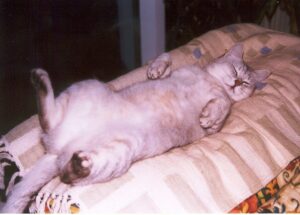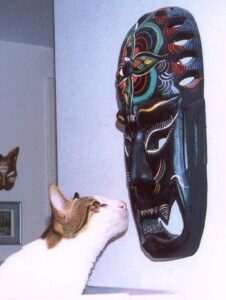Barks Blog
Are Cats Just Like Us?
By Beth Adelman MS

My husband and I spent the entire spring laughing every time we saw an ad for the movie Keanu that showed an impossibly adorable kitten dressed up like a gang member. Now we are also laughing at the ads for The Secret Life of Pets, which, like virtually all animated movies about animals, suggests the only way to make them interesting is to pretend they are just like us.
Animal behaviorists call this anthropomorphizing—attributing human characteristics to a non-human—and in scholarly circles it’s a crime punishable by (academic) death. But is it really that bad to imagine our cats are just like us?
Well, in some ways, I would argue that it’s not. (Do I hear the behavior police pounding at my door?) When I think about what I want in my life, it helps me understand some of the things my cats also want. I want to eat my meals undisturbed. I want fresh water with nothing floating in it. I want a clean, quiet bathroom. I want opportunities to stretch my body and flex my brain. If people touch me all the time, even when I ask them not to, I get irritable. These are all things I have in common with my cats. If I imagine the cats are just like me, it actually helps me give them a better life.

But there are other ways in which anthropomorphism can do a lot of harm. I find it tends to be when we attribute motivations to our cats that are really human motivations: He scratches the couch out of spite. (He scratches there because it’s the best scratching surface in the house.) She pees on my clothes because she’s angry. (Actually, she’s stressed, and peeing on something that smells like you is so comforting.) He bites because he’s trying to dominate me. (He’s bites because he’s either bored or scared.) She hisses at my boyfriend because she’s jealous. (She hisses because he scares her.)
Animals do things for reasons that make sense to animals—and they are not always the same things that make sense to us. So we think they’re acting spiteful or jealous or just plain crazy, because if I peed on your clothes, that would be pretty crazy. But I’m not a cat. Understanding motivations is one area where we can’t anthropomorphize. If we do, we will end up disliking our cats—and never really addressing their problems.
So is anthropomorphism good or bad? If it leads you to do something good for your cat, great! Whether your idea is right or wrong, your cat’s life is better. But if it leads you to conclude something bad about your cat, think again. Your cat lives with you as a member of your family, but in the end, she is an animal. What motivates her, what upsets her, what delights her, what she needs, what she doesn’t need—these are all based on her species, which is not human.
Personally, one of the things I love best about my cats is their otherness—the things they do that are not human at all. They are amazing hunters. They have super powers (compared to me). They react to sounds and smells in ways I would never expect. They see the world entirely differently. When I watch them closely, in all their “catness,” I get little glimpses of that, and it fascinates me. The secret lives of my pets are way more interesting when they’re nothing at all like me.
About the Author
Beth Adelman, MS, is a Cat Behavior Consultant in Brooklyn, New York. She currently is a regular speaker on cat behavior at New York’s Meow Parlour and sits on PPG’s Cat Committee.
